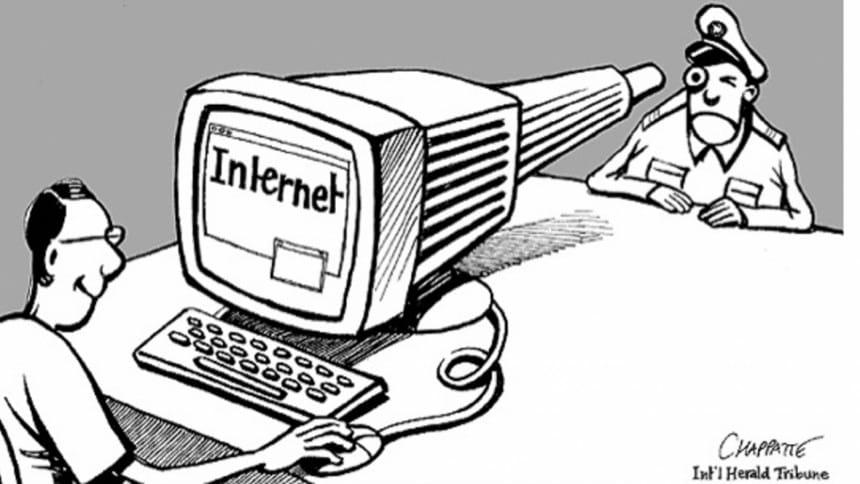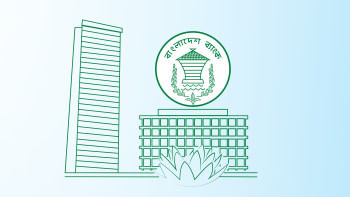Opinion: Is there a need for another ONLINE POLICY?

To enjoy the protection of the law, and to be treated in accordance with law, and only in accordance with law, is the inalienable right of every citizen, wherever he may be, and of every other person for the time being within Bangladesh, and in particular no action detrimental to the life, liberty, body, reputation or property of any person shall be taken except in accordance with law' - Article 31 of the Constitution of the People's Republic of Bangladesh.
Laws failed to protect the lives of Rajib, Wasiqur, Avijit, Ananta and Niladri - the bloggers who were killed between February 2013 and August 2015. At least in Niladri's case, his right to be protected was denied by law enforcing agencies as they declined to take any step to protect his life. Avijit returned to Bangladesh only to be hacked to death. Although the law is yet to bring the killers to justice for such worst case scenarios of crime, a new policy is on the card to control the online media including social media, blogs, personal diaries and online versions of print media. At present, there are a number of laws and policies directly or indirectly related to online media, including the Bangladesh Information Security Policy Guideline 2013, National Broadcasting Policy (NBP) 2014, Information and Communication Technology (Amendment) Act 2013 and the draft Cyber Security Act 2015.
Another similar policy, the National Online Mass Media Policy (NOMMP) was initiated by the Ministry of Information (MoI) recently. The ministry shared the draft on its website on July 21 and called for opinions by August 31. The policy is aimed at bringing almost all forms of online activity (both at personal and enterprise level) under the control of the government. If implemented, any form of online media, whether it is operated by individuals or enterprises, will need to obtain the license/permission from the government for its operation. The MoI preferred to play hide and seek and did not officially invite anyone to send in their opinion. The media, civil society, experts and activists were completely in the dark until the MoI minister talked about it at a public function.
Even though the policy talks about governing the online media through a National Broadcasting Commission (NBC), its operational modality will make the commission completely powerless and dependent on the government, especially on the MoI. If formed according to the tabled idea stated in policy, the commission will have no teeth, as it will only be a recommending authority to the government. The country's experience with different commissions has not been very pleasant; the Anti Corruption Commission (ACC) has failed to win peoples' confidence as, apart from a few exceptions, it has failed to bring corrupt influential and powerful individuals under law. Most recently, the chairman of the National Human Rights Commission (NHRC) called upon the government to ensure the freedom of the organisation.
In this backdrop, it is not very clear how the proposed NBC will run its activities. Furthermore, there is no proposed timeline on when and how the government will establish the NBC. One year back, in August 2014, when the broadcasting policy was introduced, ignoring the views of stakeholders, the MoI minister defended the initiative and committed to establish a broadcasting commission, which would implement the policy and bring about the desired changes, within six months. However, no development has yet been made regarding the establishment of the commission. As the government will be in charge of making decisions regarding the NOMMP until the commission is formed, it will only result in further strengthening the government's control over online media.
The NOMMP does not contain any analysis on the current state of online media. It also failed to justify the need for a separate policy for online media as its different clauses are quite similar to the NBP. If such is the case, it is not clear whether the government really wants to establish good governance in this sector or merely curtail constitutional guarantee of freedom of the press (Article 39). The policy neither contains any online media industry friendly guideline nor provides strategies that would exhibit government's support. The policy contains an estimated 120 clauses, of which 50 clauses list the 'don'ts' while the rest list the 'dos'; failing to obey these rules may result in complete shutdown of any online media. Interestingly, the government is seemingly more concerned about online advertising than the online media industry as a whole. The fourth chapter on advertising is the biggest of all, with 50 clauses imposing a number of restrictions on online media. Besides operations, such restrictions may have significant negative impacts on revenue earning.
The policy ensures government's support and conditional permission for operation of online media, while also looking toward setting an international standard. However, it does not elaborate on any of these points, particularly the conditionality of granting the license/permission to online media, and does not explain in detail about the granting authority. In addition, the policy asks online media to broadcast development programmes, many of which are carried out by the government. Directives in chapter five on ineligibility to broadcast will limit the freedom of online media to a great extent by imposing restrictions on broadcasting political and bilateral issue related news. The most frustrating part of this policy is perhaps its restrictions on broadcasting crime news including rape, violence against women and children, illegal trade involving women and children, and prostitution.
Like any other sector, we definitely need good governance in online media as well. But only laws and policies cannot ensure governance. The NOMMP also indicates that a few more laws and policies are on the cards. We have had enough laws and policies and another one will have no impact on establishing good governance, unless the government is really committed to do so. To this end, the government should establish an independent, powerful and neutral National Broadcasting Commission that would work on making existing laws and policies friendly to the media industry and above all ensure the freedom of the press.
The writer is a communication for development professional. Email: [email protected]

 For all latest news, follow The Daily Star's Google News channel.
For all latest news, follow The Daily Star's Google News channel. 



Comments